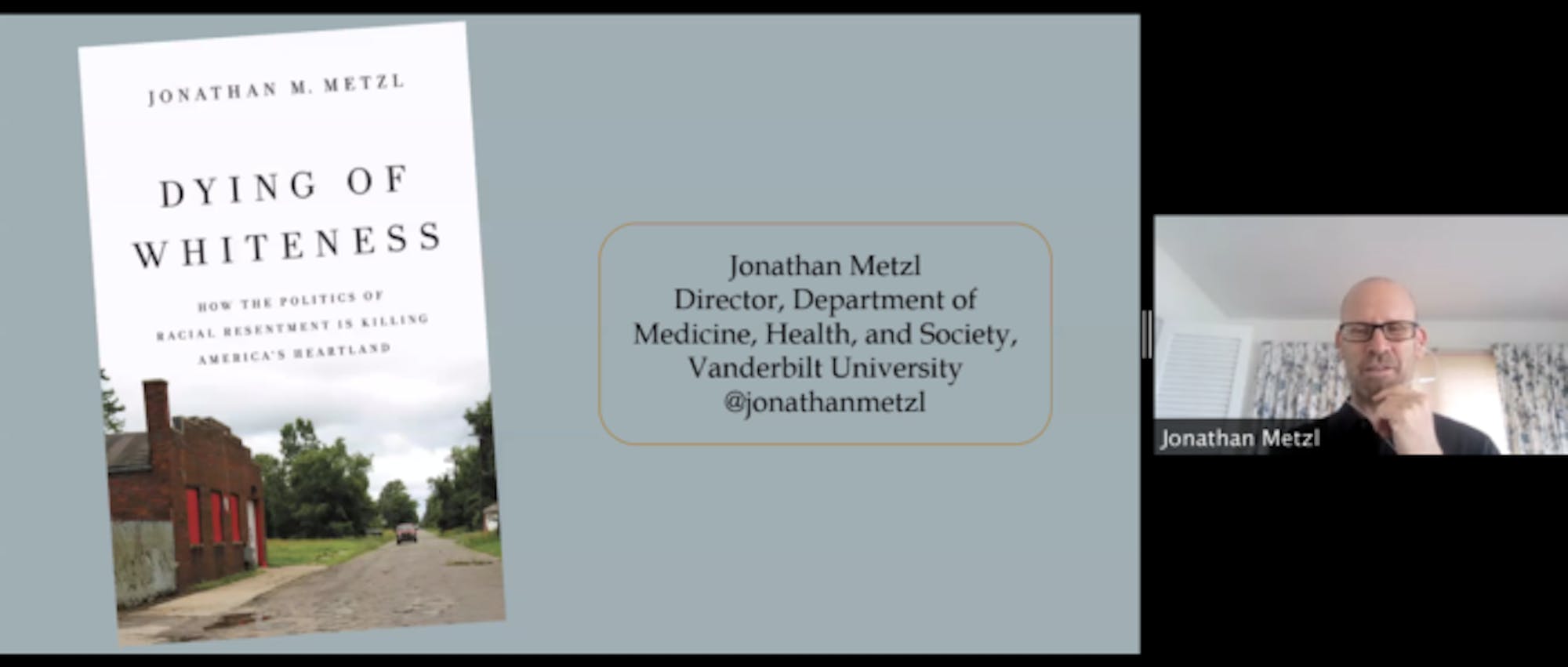Last Friday, Jonathan Metzl, Vanderbilt University professor of sociology and psychiatry, discussed the tension between racial prejudice and economic self-interest as portrayed in his book “Dying of Whiteness: How the Politics of Racial Resentment is Killing America’s Heartland.”
Metzl’s discussion was part of the “Building an Anti-Racist Vocabulary” weekly lecture series hosted by the Klau Center for Civil and Human Rights.
At the beginning of the lecture, Metzl noted that a lot of his work examines questions of race and the ways race, racial tensions, politics and economics shape what we think about in terms of illness and health in the U.S.
“Certainly that question of health being political and polarizing is one that we’ve seen in technicolor over the course of this pandemic,” Metzl said. “When there were times for us to potentially come together or find a common cause, things like an election, for example, or something like that that we would think would be moments of kind of unification … instead what we see is that these become racializing and polarizing.”
Metzl said polarization and racialization often go hand in hand.
When the pandemic first hit last March, the United States came to terms with the fact that the coronavirus was going to pose medical and economic flaws, he said. There was a push to expand Medicaid under the Affordable Care Act (ACA) as a logical next step to give health insurance to as many people as possible.
However, Metzl said the pushback, particularly by many red state governors, against the expansion of the ACA signaled a first step toward the pandemic becoming polarized.
“We live in a very polarized world, and that to me is really the wrong attitude when faced with something like the coronavirus,” he said.
Metzl said polarization exists not only in the coronavirus pandemic but also in the pandemics of racial injustice, inequity, racism and violence. This polarization stems from a lack of social cohesion, which Metzl believes is what we should be striving for.
Published in 2019, “Dying of Whiteness” ultimately asks how our country became so polarized.
In his book, Metzl tracks half of a century of undermined trust in public institutions and infrastructures. His argument is that divisions are often blamed and obscured by racial tensions that are in relationship to “whiteness.”
“Particularly, this kind of anti-immigrant, anti-government, pro-gun kind of politics that is standing up for making America great again, the way things used to be, this kind of nostalgia that in a way makes this division about whiteness even seemingly more impossible to address,” Metzl said.
About three months after ACA went into effect, the “disinformation machine,” as Metzl calls it, took over, conveying the message that the government was going to intrude on personal liberties and that Black people were going to cut in line and take resources.
This changed the ACA narrative, Metzl said, and people previously excited for the ACA were now protesting free health care for fear that minority groups not paying taxes would reap its benefits. He said real racial divisions took place when Black men were asked who benefits from the health care reform versus when white men were asked.
Black men believed society benefited from the health care reform, but white believed it did not, Metzl argued.
“Really sick white men would say they reject the Affordable Care Act because Black people go to two or three doctors and use the heck out of it,” Metzl said.
He said it was that narrative of whiteness that played into the racialization and the polarization of the ACA, which ultimately caused the program to fall apart.
“This idea of making America great again is based on this fantasy that you need to have a good social program for me but not the other guy, which is one of the risks of this pandemic” Metzl said. “Part of why that’s hard is because a lot of issues like healthcare, guns, education, have become identities. It’s not talking about policy anymore; it’s like what it means to be white.”
When thinking about the coronavirus, Metzl said the illness highlights the inequity in our nation. It provides an opportunity to make important decisions about how societies come out of the pandemic.
“If we are dying, let’s not just develop vaccines. Let’s also declare war on structural inequity. Let’s make our world more accessible, more equitable, more fair because building better equity will bring us together in a common cause,” Metzl said. “It will be like our lunar landing.”
Vanderbilt professor analyzes racial implications of pandemic
Courtesy of Lauren Kesic
Lecture guest Jonathon Metzl is also the director of the Center for Medicine, Health, and Society at Vanderbilt University.









